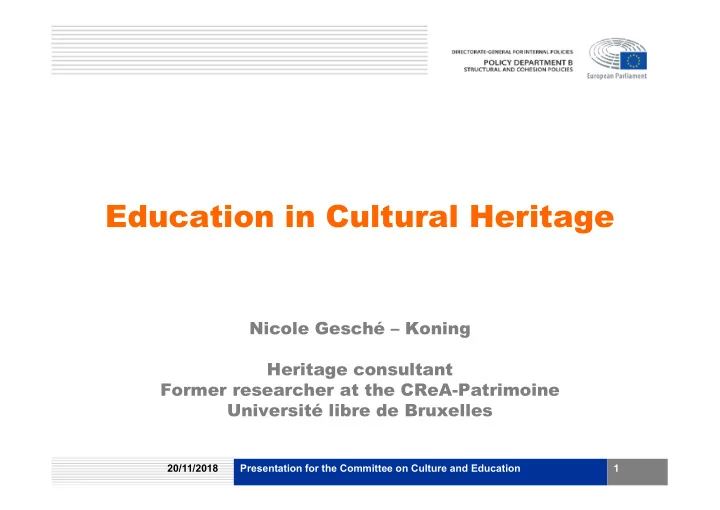

Education in Cultural Heritage Nicole Gesché – Koning Heritage consultant Former researcher at the CReA-Patrimoine Université libre de Bruxelles 20/11/2018 Presentation for the Committee on Culture and Education 1
Structure of the Presentation 1. Introduction 2. Key Findings 3. Recommendations 20/11/2018 Presentation for the Committee on Fisheries 2
1. Introduction This study aimed at analysing potential synergies between education and cultural heritage policies . What is needed to make possible existing synergies more efficient? Where and how can education and cultural heritage meet in order to enhance people’s capability to become not only fulfilled but also responsible citizens ? 20/11/2018 Presentation for the Committee on Culture and Education 3
2. Key Findings Much confusion between countries and languages about culture, cultural heritage, education, art education & cultural heritage education. Variety of bodies to which belong the heritage and the education policies. Synergies exist and successful examples are listed. BUT these synergies are insufficient : Why? 20/11/2018 Presentation for the Committee on Culture and Education 4
2. Key Findings Cultural heritage seen more as a stopgap for education. Education not rooted deeply enough in cultural heritage . Synergies between both sectors are not sufficiently incorporated structurally : - too many “band-aid” solutions, - too many individual short term initiatives 20/11/2018 Presentation for the Committee on Culture and Education 5
2. Key Findings Additional recommendations & studies: - Culture and Education for All: Building the Skills for More Resilient Societies (Lifelong Learning Platform, Culture Action Europe, the European Association for the Education of Adults, the European Distance and e-learning Network, the European University Foundation, Euroclio, Europeana, and Public Libraries 2020) - Information: http://lllplatform.eu/lll/wp-content/uploads/2015/09/Joint-position- paper_Building-synergies-education-and-culture.pdf - Gustafsson, C & Mellár, B (2018), Best practices in sustainable management and safeguarding of cultural heritage in the EU Research for CULT Committee – European Parliament, Policy Department for Structural and Cohesion Policies, Brussels 20/11/2018 Presentation for the Committee on Culture and Education 6
3. Recommendations • Encourage the structural incorporation of heritage education in all school curricula: Education and cultural heritage should be key components of all learning processes . ( LLL: Implement a shared cross-sectoral strategy for education and culture at EU level, reflected in both policy and programmes & Adopt targeted measures to improve implementation of key competence Cultural Awareness and Expression) 20/11/2018 Presentation for the Committee on Culture and Education 7
3. Recommendations • Clear definitions of culture, cultural heritage, education, art education & cultural heritage education establishing a European glossary • Allow for a better dissemination of good practice transferable examples and shared information 20/11/2018 Presentation for the Committee on Culture and Education 8
3. Recommendations • Encourage training courses in heritage education insisting on the human side of heritage through for example the Erasmus+ programme ( LLL: Boost quality learning mobility for learners, educators and cultural professionals ) 20/11/2018 Presentation for the Committee on Culture and Education 9
3. Recommendations • Plan the financial resources: - Building on the long term ; - Establishing financial synergies between EU committees; and - Building strong relationships rather than multiplying one-shot events. ( LLL: Match the high importance of education and culture with adequate investment and programmes ) 20/11/2018 Presentation for the Committee on Culture and Education 10
Recommend
More recommend